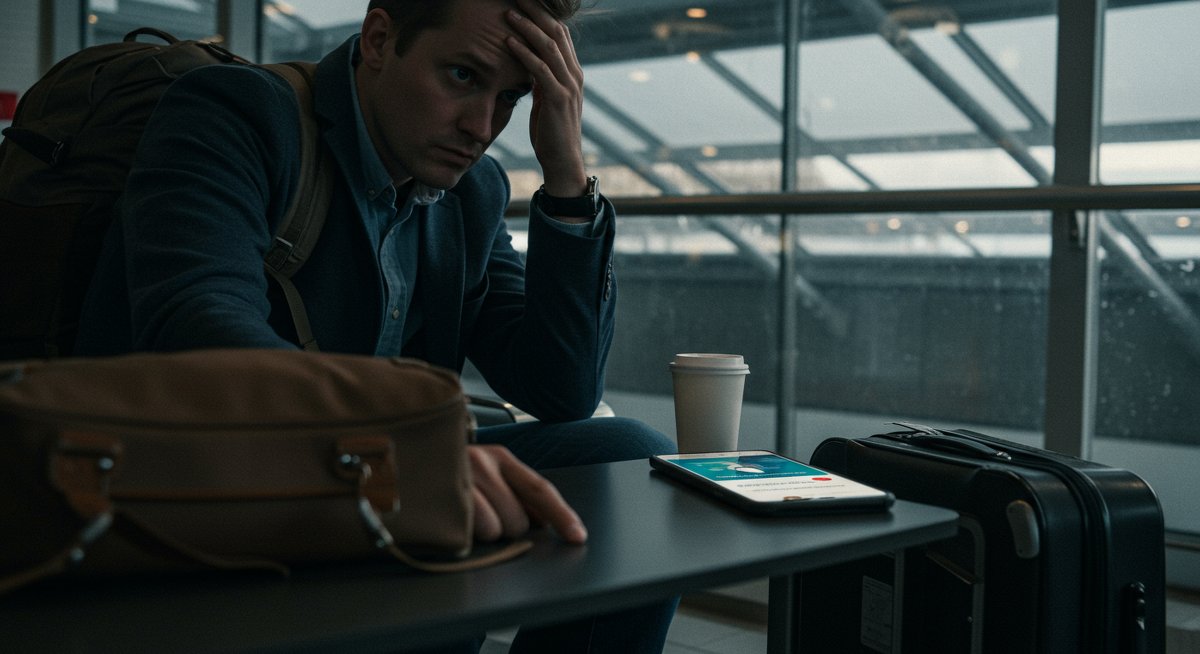Losing your debit card while traveling internationally? It's a situation that can be stressful. But don't panic. This guide is your lifeline, providing a clear, step-by-step action plan to protect your finances and get you back on track. Let's be honest: nobody wants to deal with this while on vacation. But knowing exactly what to do can turn a crisis into a minor inconvenience. This is your complete guide to navigating this stressful situation in 2025.

The problem: What's really happening
Losing your debit card abroad is more than just the loss of a piece of plastic. It's a potential financial nightmare. Unauthorized transactions, the inability to access your funds, and the sheer stress of the situation can quickly ruin your trip. The risks are amplified with increasing fraud and sophisticated scams. When your card goes missing, time is of the essence.
- Unauthorized Transactions: The most immediate threat is someone using your card to make purchases. Even small transactions can add up, and without swift action, you could face significant financial losses.
- Loss of Access to Funds: Your debit card is your key to accessing your travel funds. Without it, you're stuck, unable to pay for accommodations, transportation, food, or any other essential expenses.
- Fraud and Identity Theft: In some cases, a lost or stolen card can lead to more serious issues like identity theft. Criminals might use your information to open new accounts or make fraudulent purchases.
Let's consider an example. Imagine you're in Rome, and realize your debit card is gone. You need to pay for your hotel, and you have no other means of payment. You're stranded. Another scenario: You're backpacking through Southeast Asia and discover that your card has been used for several unauthorized online purchases. These are real threats, and the impact can be significant. Being prepared is crucial.
Why this affects international travelers
International travelers face unique challenges when their debit cards go missing.
- Distance and Communication: You're far from home, making it difficult to contact your bank and report the loss. Time zone differences and language barriers can further complicate the process.
- Access to Local Resources: You might not know where to find a local bank branch or even have reliable access to the internet or phone to contact your bank.
- Currency Exchange: Without your card, you might be forced to rely on expensive currency exchange services, further depleting your budget.
Many travelers find themselves in difficult situations. For instance, picture this: you are in Japan, and it's the middle of the night. Your bank is closed in your home country. What do you do? Or, perhaps you are in South America, where ATMs are not always readily available, and your card is your lifeline.
Root causes analysis
Understanding why your card was lost or stolen helps prevent future issues.
- Theft: Pickpockets, scams, and outright theft are common in tourist areas. Always be aware of your surroundings and keep your card secure.
- Accidental Loss: Cards can easily be dropped or forgotten in ATMs, restaurants, or taxis. Double-check your belongings regularly.
- Skimming: Criminals may use devices to steal your card information at ATMs or point-of-sale terminals. Always inspect the card reader for any unusual attachments.
Consider a case where you used an ATM at a busy train station and forgot your card. This is a common example of accidental loss. Another scenario involves a sophisticated skimming device placed on an ATM, which is a more insidious problem. Being vigilant about these risks is essential.
Step-by-step solution framework
Here's an immediate action plan to follow:
- Report the Loss Immediately: As soon as you realize your card is missing, contact your bank or card issuer. Most banks have 24/7 customer service lines for this purpose. Make sure to report the loss to stop any unauthorized activity. Be sure to follow the specific steps outlined by your bank. You’ll likely need to provide your card number, personal information, and the date/location of the loss.
- Example: If you're a customer of a major bank like Chase, locate the international phone number on their website or card. Call them immediately to report your card as lost or stolen.
- Freeze Your Card: Many banks offer the option to temporarily freeze your card through their mobile app or website. This is a quick way to prevent any further transactions while you investigate the situation. It gives you some breathing room. It is usually easy to implement and can be done in minutes.
- Example: Using your Bank of America app, you can instantly freeze your debit card, preventing any new transactions. You can unfreeze it if you find the card.
- File a Police Report: While not always mandatory, filing a police report can be useful, especially if you suspect theft. The report provides documentation that you can use to support your claim if fraudulent charges appear on your account. Also, it is generally a good idea to cover your bases with official documentation.
- Example: If you believe your card was stolen in Paris, go to the nearest police station to file a report. Keep a copy of the report for your records.
- Contact Your Bank/Card Issuer: After reporting the loss and filing a police report (if applicable), contact your bank or card issuer to discuss the next steps. They will likely cancel your existing card and issue a replacement.
- Example: Call the customer service line for your card (Visa or Mastercard). They will work to cancel your card and arrange for a replacement. Be prepared to provide your card number, account details, and other relevant information.
- Secure Alternative Funds: If you have another debit card, credit card, or access to emergency funds, use them. If not, explore options like wire transfers or asking a trusted friend or family member to send you money.
- Example: If you have a credit card, use it to cover immediate expenses like accommodation and food. Or, if a family member can wire money via Western Union, use this as an option.
- Get a Replacement Card: Your bank or card issuer will send you a replacement card. The delivery time varies depending on your location, but it can take several days or even weeks. Ensure your mailing address is correct. You can also arrange for a card to be sent to a local bank branch for pickup.
- Example: If you're in London, your bank might be able to send a replacement card to a local branch within a few days. Check with your bank to understand their specific policies for replacement card delivery.
- Monitor Your Accounts: Keep a close eye on your accounts for any unauthorized transactions. If you see anything suspicious, report it to your bank immediately.
- Example: Regularly check your online banking activity for unusual purchases. If you spot anything, such as transactions in a currency you are unfamiliar with, contact your bank immediately to dispute the charges.
Prevention strategies
Prevention is always better than cure.
- Keep Your Card Safe: Never let your card out of your sight. Shield your PIN when using ATMs or point-of-sale terminals.
- Use ATMs Wisely: Choose ATMs in well-lit, public areas. Inspect the card reader for any signs of tampering.
- Be Aware of Scams: Be wary of anyone who approaches you asking for your card details or PIN.
- Carry a Backup: Consider carrying a backup card (different bank) in a separate location.
Consider the case of using an ATM in a busy market. Always shield your PIN and be aware of anyone who might be watching. Or, consider carrying a spare card in your hotel safe or a different bag. This is a great way to hedge your bets.

When to seek professional help
While this guide covers most situations, there are times when you might need professional help.
- Legal Assistance: If you experience identity theft or face significant financial losses, you might need to consult a lawyer.
- Fraud Investigations: Your bank may have a fraud investigation team to help resolve complex cases.
International legal protections
International laws and regulations offer some protection for debit card users.
- Zero Liability Policies: Most card issuers offer zero liability policies, which protect you from unauthorized charges. Contact your bank for more details.
- Consumer Protection Laws: Consumer protection laws in various countries may provide additional safeguards.
Your action checklist
- Report the Loss: Immediately contact your bank or card issuer.
- Freeze Your Card: Use your bank's app or website to freeze the card.
- File a Police Report: If theft is suspected.
- Contact Your Bank: Discuss the next steps for card replacement and potential fraud claims.
- Secure Alternative Funds: Use backup cards, credit cards, or wire transfers.
- Get a Replacement Card: Arrange for a replacement card to be sent to you.
- Monitor Your Accounts: Regularly check your transactions for fraud.
Next steps in your travel journey
Losing your debit card is an unfortunate experience, but it doesn't have to define your trip. By following this action plan, you can minimise the damage and get back to enjoying your travels. Always remember to keep your cards safe, be aware of your surroundings, and have a backup plan in place. If you’re on this journey too, I’d love to hear how it goes for you. Safe travels!